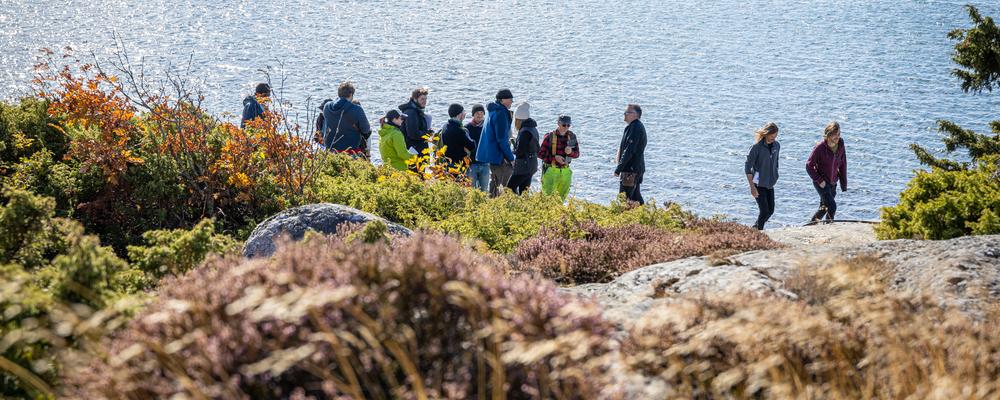
Master's in Earth Sciences: Programme Structure and Content
The Master’s Programme consists of a mandatory Master thesis and elective courses.
We offer two different focuses in the program and eligibility is based on a course-by-course basis (see pre-requisites for each course listed in their course plans). A student starting with a background in geology cannot easily hop immediately to courses in climatology or vice versa without adding in extra courses to their program for eligibility. Requires extra planning.
Courses given in the academic year 2024
Spring 2024
Quartile 1
Advanced Geochemistry (GVG490) 7.5 credits
Quartile 1-2
Climate modelling (GVN465) 15 credits
Quartile 2
Ore-forming processes (GVG450) 7,5 credits
Quartile 3
Applied Geophysics (GVG470) 7.5 credits
Quartile 3-4
Sustainable development: A case study approach (ES2423) 15 credits
Registration for programme students is automatic.
Geophysics III The real world (GVG570) 7.5 credits (PDF)
Please note! Only programme students are eligible for this course. Contact study counselling if you are interested in taking this course: svl@gvc.gu.se
Courses given in the academic year 24/25*
* Updates on courses offered in the fall semester of 2024 will be published on this web page the latest March 15, 2024. Courses offered for spring 2025 will be published soon after. For more information, please contact study counselling svl@gvc.gu.se
Fall semester 2024
Quartile 1
Global change - problem, analysis, measures (ES2613) 7.5 credits
Applied Hydrogeology (GVG460) 7.5 credits
Quartile 2
Climate Change in an Earth system perspective (GVN460) 7.5 credits
Advanced Structural Geology (GVG465) 7.5 credits
Quartile 3
Glacial Landforms and Sediments (GVK450) 7.5 credits
Quartile 4
Advanced petrology (GVG410) 7.5 credits
Nature-based solutions, potentials pitfalls and goal conflicts, 7.5 credits (Course syllabus published spring 2024)
Master's seminar
Master’s Seminar (GV0401), 5 credits
Master’s Seminar (GV0502), 5 credits
Project and thesis courses
Both project courses and thesis courses are applied to individually. Please contact study counselling with further questions: svl@gvc.gu.se
- Master thesis in Earth Sciences (GV0460), 60 credits
- Master thesis in Earth Sciences (GV0445), 45 credits
- Master thesis in Earth Sciences (GV0430), 30 credits
- Advanced Project in Earth Sciences (GVN75A), 7.5 credits
- Project work in Earth science (GV015A), 15 credits
All courses on Master's level
The list below includes all courses on Master's level
Geology
- Earth Science excursion I (GV4000), 15 credits
- Quaternary Development and Paleoclimate (GVK440), 7.5 credits
- Ore-forming processes (GVG450) 7.5 credits
- Advanced structural geology (GVG465), 7.5 credits
- Applied Hydrogeology (GVG460), 7.5 credits
- Advanced Petrology (GVG410), 7.5 credits
- Applied Geophysics (GVG470), 7.5 credits
- Regional geology field course (GVG480), 7.5 credits
- Advanced Geochemistry (GVG490), 7.5 credits
- Environmental geology (GVK430), 15 credits
Climatology
- Climate modelling (GVN465), 15 credits
- Quaternary Development and Paleoclimate (GVK440), 7.5 credits
- Global change - problem, analysis measures (ES2613), 7.5 credits
- Sustainable development: A case study approach (ES2423), 15 credits
- Climate Change in an Earth system perspective (GVN460), 7.5 credits
- Biogeochemistry (GVK470), 15 credits
- Earth Systems Field Course, 15 credits (new course offered in spring 2025)
Further courses outside the programme
You are welcome to participate in courses outside our programme. Often of interest are courses from the
- Geography Master’s programme, for example master’s level GIS or Urban Climate and Urban Planning
- Environmental Master’s programme, for example Chemical Risk Assessment and Applied Environmental Law.
Please note that you need to apply separately to the courses via admission as an elective course.
Bachelor's level
You are welcome to take 30 credits at the bachelor’s level; many of our courses are taught in English.

